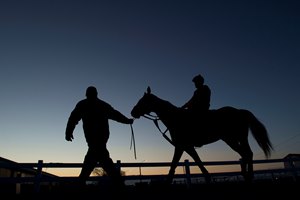Recent Expansion of H-2B Visas Could Help Horsemen


A federal program that will allow more temporary workers from three Central American countries, as well as Haiti, could provide some options for horsemen.
The federal government recently provided some good news for horsemen searching for labor options by expanding the H-2B program that provides temporary nonagricultural worker visas. Beginning this month and continuing through September, the Department of Homeland Security and the Department of Labor will make an additional 35,000 H-2B visas available.
This supplemental H-2B visa allocation consists of 23,500 visas available to returning workers who received an H-2B visa during one of the past three fiscal years. The remaining 11,500 visas, which are exempt from the returning worker requirement, are reserved for nationals of Haiti, Honduras, Guatemala, and El Salvador.
William Velie, a sports immigration attorney and head of the Oklahoma-based Horsemen Labor Solutions, said the addition of those latter 11,500 visas is aimed at reducing the number of unauthorized immigrants arriving from those nations by providing an option to work in the U.S. Velie said workers from Guatemala, in particular, could prove a nice option for horsemen.
"What is good for our industry is that a lot of the very best horsemen come from a place called Santa Rosa, Guatemala," Velie said, noting a tradition in that region of working with horses. "When you go to the backside of the track and meet people, if they say they're from Guatemala, you can ask them if they're from Santa Rosa. Usually they say, 'Yes, how'd you know?' So it actually works to the benefit of horsemen here."
In a joint statement announcing the April-September H-2B visas, the Department of Homeland Security and Department of Labor noted increased industry demand.
"We are announcing the availability of an additional 35,000 H-2B visas that will help to support American businesses and expand legal pathways for workers seeking to come to the United States," said Homeland Security secretary Alejandro Mayorkas. "Recognizing the importance of strong worker protections, we will apply greater scrutiny to those employers who have a record of violating obligations to their workers and the H-2B program."
Employers, including horsemen, seeking to hire H-2B workers must take a series of steps to test the U.S. labor market. They must provide certification from the Department of Labor that proves there are not enough U.S. workers who are able, willing, qualified, and available to do the temporary work for which they seek a prospective foreign worker, and that employing the H-2B workers will not adversely affect the wages and working conditions of similarly employed U.S. workers.
Velie reminded horsemen at last month's National Horsemen's Benevolent and Protective Association conference that while the H-2B visas are temporary, they're defined by location. As horsemen move seasonally, there is the opportunity for the visas to be renewed under the new location of the stable.
"It's worked out really well," Velie said of the visa program's supply of workers for the racing industry. He said that at the beginning of this year the various industries that participated submitted 135,000 applications for what was then 30,000 spots. "Since about 2015 we've been able to navigate our way through very difficult circumstances."
